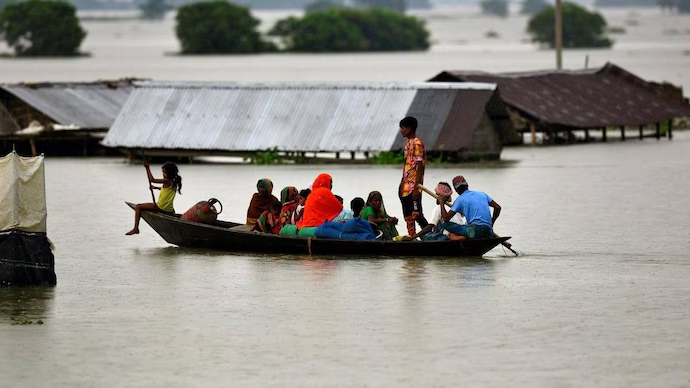_(1).webp)
Munni Begum
Beparipara village in South Salamara district of Assam offers a lesson in turning adversity into an opportunity. The villagers – mostly Muslims - have turned the annual floods that earlier devastated their area into an opportunity; As soon as the flood waters inundate the area, they quickly catch fishes.
After the flood subsides, they sundry the fish and sell it in the markets at a good price. The sale of dried fish is the only source of livelihood for most villagers in Beparipara.
The aroma of dried fish overwhelms your olfactory senses once you enter the village.
Nurani Begum from Beparipa participated in the 'Assamese Saros Mela' organized by the National Rural Livelihood Mission under the Ministry of Rural Development, Government of India, and promoted the naturally-dried fish.
.webp) Dry fish at Nurani Begum's stall
Dry fish at Nurani Begum's stall
Speaking to Awaz-The Voice, Nurani Begum said, "I have been involved in the dried fish business since childhood. Throughout the year we make suitable arrangements to keep the dried fish ready to supply to the customers. During the rainy season, we buy large quantities of fresh fish from various traders and also catch various varieties of fish from canals, beaches, and rivers for drying.”
Drying and preserving fish is a very old practice. This is because in the old days, there were no other preservatives like refrigerators, so it was not possible to preserve fresh fish for long periods of time.
This practice has now become the only source of livelihood for the people of Beparipara village. They have been supplying dried fish to Assam and various states of the North East.
"We have dried fish available at all times in the rainy season and dry season. We remove the stomachs of the fresh fish collected from various traders and wash them cleanly. After drying the fish well, packets weighing 100 g to 1 kg are prepared and marketed. We dry about 20-40 kg of fish a day and everyone in my family works together,” Nurani Begum said.
Nurani Begum, a member of Sonali Self Help Group, dries and preserves fish with local names like Bamla fish, Suri fish, Nakturi, Misa fish, Keski fish, Chelekni fish, Moamas, etc.
 A swollen river in Assam (File)
A swollen river in Assam (File)
"I dry the fish only in the sun instead of the fire. Because when you dry the fish properly in the fire, they turn pink and smell smoky. This changes the taste of the fish a little bit. Another reason why fish are dried in the sun is that together large quantities of fish can be dried." Nurani Begum said.
Nurani Begum, who earns between Rs 50,000 and Rs 1 lakh annually, takes dried fish to every weekly market on the Assam-Meghalaya border in South Salmara for sale.
Each time she goes to this market she sells about 30 to 40 kg of fish, earning Rs 15,000-20,000, she said.
She also takes the dried fish to fairs held in different parts of Assam with her son Akhtar Hussain to sell them. They have fish priced from Rs. 50 to Rs. 1000.
"The dried fish business is very good. Most of the people in our village earn their living from this business. We collect 10/20 quintals of fish throughout the year. I use bleaching powder under the sheds to prevent insects from catching the fish. The whole family is involved in this business. I clean, wash, dry, and pack the fish at home.”
ALSO READ: Asgar Ali has created longest painting on Lord Ram, his muse is Krishna
The 400 families of Beparipara village in South Salmara are self-sufficient in the dried fish business. They are making a living from the dried fish business.
